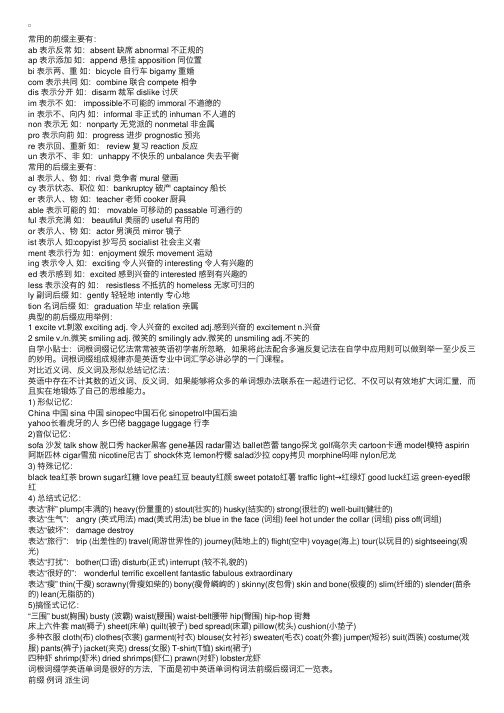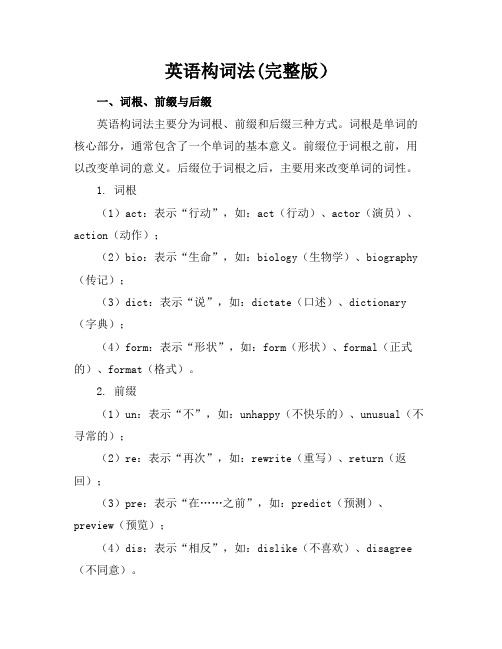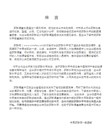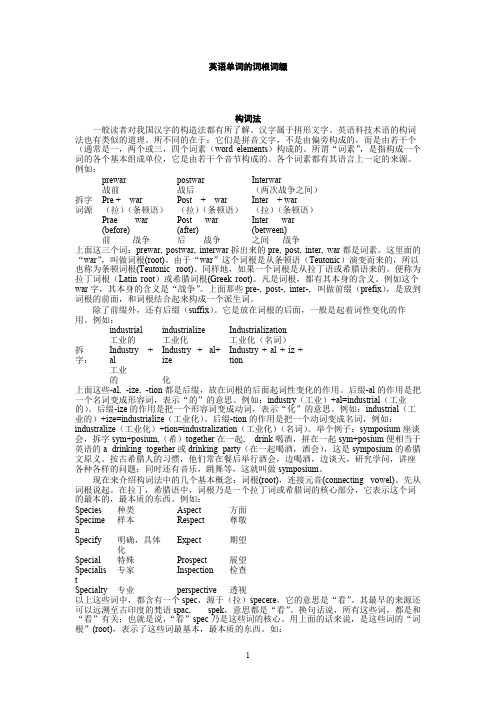英语词根词缀构词法
词根词缀构词法(1) 共28页

outside,outlook
under-
“在…下面,下的”
mid-
“中,中间”
re-
“再一次,重新”
ex-
“先,故,旧”
underground,underwater midnight,Mid-Autumn retell,rewrite ex-president,ex-husband
常 见 前 缀-数 量 前 缀
• 你猜猜看?
• uniform, kilometer, multinational, unique,
kilogram, multicultural
另类记忆
uni- 单一,唯一 kilo- 千
multi- 许多
• en- 使...... • enslave, enable, enrich
小拓展
• 开音节:a) 辅音+元音+辅音+e : name, shine
•
b) 辅音+元音: go, hi, be
• 闭音节:a) 辅音+元音+辅音: bad, sit
•
b)元音+辅音: of, up
单词记忆方法
• 常见字母组合及其发音:
-sion-tion
[∫ən] impressionnation
disappointment
appointment
(n.失望)
(n.约会,任命)
disappoint
point appoint
(v.任命,约定)
(v.使......失望)
disappointed
appointed
(adj.感到失望的)
(adj.指定的,约定的)
初中英语单词词根词缀记忆法大全

常⽤的前缀主要有:ab 表⽰反常如:absent 缺席 abnormal 不正规的ap 表⽰添加如:append 悬挂 apposition 同位置bi 表⽰两、重如:bicycle ⾃⾏车 bigamy 重婚com 表⽰共同如:combine 联合 compete 相争dis 表⽰分开如:disarm 裁军 dislike 讨厌im 表⽰不如: impossible不可能的 immoral 不道德的in 表⽰不、向内如:informal ⾮正式的 inhuman 不⼈道的non 表⽰⽆如:nonparty ⽆党派的 nonmetal ⾮⾦属pro 表⽰向前如:progress 进步 prognostic 预兆re 表⽰回、重新如: review 复习 reaction 反应un 表⽰不、⾮如:unhappy 不快乐的 unbalance 失去平衡常⽤的后缀主要有:al 表⽰⼈、物如:rival 竞争者 mural 壁画cy 表⽰状态、职位如:bankruptcy 破产 captaincy 船长er 表⽰⼈、物如:teacher ⽼师 cooker 厨具able 表⽰可能的如: movable 可移动的 passable 可通⾏的ful 表⽰充满如: beautiful 美丽的 useful 有⽤的or 表⽰⼈、物如:actor 男演员 mirror 镜⼦ist 表⽰⼈如:copyist 抄写员 socialist 社会主义者ment 表⽰⾏为如:enjoyment 娱乐 movement 运动ing 表⽰令⼈如:exciting 令⼈兴奋的 interesting 令⼈有兴趣的ed 表⽰感到如:excited 感到兴奋的 interested 感到有兴趣的less 表⽰没有的如: resistless 不抵抗的 homeless ⽆家可归的ly 副词后缀如:gently 轻轻地 intently 专⼼地tion 名词后缀如:graduation 毕业 relation 亲属典型的前后缀应⽤举例:1 excite vt.刺激 exciting adj. 令⼈兴奋的 excited adj.感到兴奋的 excitement n.兴奋2 smile v./n.微笑 smiling adj. 微笑的 smilingly adv.微笑的 unsmiling adj.不笑的⾃学⼩贴⼠:词根词缀记忆法常常被英语初学者所忽略,如果将此法配合多遍反复记法在⾃学中应⽤则可以做到举⼀⾄少反三的妙⽤。
词根词缀构词法

词根词缀构词法发 散 思 维 训 练point appoint(v.任命,约定) appointment(n.约会,任命) appointed(adj.指定的,约定的) disappoint (v.使......失望)disappointment (n.失望)disappointed(adj.感到失望的) disappointing(adj.令人感到......)前缀改变词义•fore- forehead, foresightpre-表示"在前”在前面” preface, preposition •international, internet inter-表示“在……间,相互”常 见 前 缀-时 间/空 间 前 缀表示表示““在前面在前面””enslave, enable, enrich前缀改变词义,en-特殊要注意uni- 单一,唯一kilo-kilo- 千multi-multi-许多•根据句意用所给单词的适当形式填空1.It's _________(possible) for us to pass the exam if we don'trevise before.2.--Have you ____ (never) been to Hongkong? --Yes ,I have been there twice.3.WTO is an _________ (national) organization.4._____ (either) of them knows where it is. They are new here.5.I am sorry I _______ (take) you as John.impossilbe ever internationalNeithermistake后缀改变词性2.某国人-n,-ian American, Canadian, Australian-ese Janpanese, Chinese3.主动与被动-er ,表示"动作发出者" employer ,interviewer ,examiner-ee,-ee, 表示"动作承受者" employee, interviewee ,examinee 4."女性的权利"----ess 1.I come from Australia,but I am not an ___________. I am a ________(canada).2. The __________ is so strick that all the____________ are afraidof him.(interview).actress, hostess, manageressAustralian Canadian interviewer interviewees-ness&-ship&-hood “情况,性质,身份,状态”•-ness•-ship •-hood常 见 名 词 后 缀 -抽 象 名 词 篇-ment vs -ing 动作名词•-ment •-inggoodness, kindness, tiredness hardship, membership, friendship childhood, manhood,neighbourhoodmovement, judgment, punishment building, writing, learning1. -ful vs -less 反义词后缀 careful-careless-ous 充分的 dangerous, generous, courageous 常 见 形 容 词 后 缀1.She likes reading books and she is _________.2.Don't swim here. It is very 2.Don't swim here. It is very _________._________.3.Our teacher Mr.Wang is _________ and he takes goodcare of us.2.2.-ish "-ish "具有相同...特征的" foolish, bookish, selfish -ly "像...一样" manly, fatherly, motherly 4.4.-able "-able "可..." movable, erasable, changeable 3.3. -ing "-ing "令人...的" interesiting, exciting -ed "(人)感到..." interested, excitedbookish dangerous fatherly后 缀 练 习•单词归类weaken, neighbourhood, hardship, generous, actor, simplify,movable examinee, building, truly, awful, modernize, artist, tiredness, upwards, motherly, selfish, movement, German, hostess, exciting,effortless 带有名词后缀的词:带有形容词后缀的词:带有副词后缀的词:带有动词后缀的词:neighbourhood,neighbourhood,hardship,actor,examinee,building,artist, tireness,movement,German,hostess generous,movable,awful,motherly,selffish,exciting,effortless truly,upwards,weaken, simplify,moderize,1. The child looked___at his brother who was badly wounded.A. sadlyB. sadnessC. saddenD. sad2. How___ he is! He is always acting____. He is really a ____.A. foolish ;foolishly ;foolB. fool ;foolish ;foolC. foolish ;fool ;foolD. foolishly ;foolish ;foolA A1.It snowed _____ last night . (heavy)2.He was the best _______ in today’s football match. (play)3.We want _______ reasons for your failure to help. (satisfy)4.She hoped that her son would become a _______. (piano)5.Thank you for your _________. (kind)6.When in Rome, do as the _______do. (Rome)7.Please give me some reference work. It will ______ my task.(simple)heavily player satisfyingpianistkindness Romans simplify养成良好记单词习惯Step 1:遵循记忆曲线。
英语构词法(常用的词根词缀总结)(K12教育文档)

(完整word版)英语构词法(常用的词根词缀总结)(word版可编辑修改) 编辑整理:尊敬的读者朋友们:这里是精品文档编辑中心,本文档内容是由我和我的同事精心编辑整理后发布的,发布之前我们对文中内容进行仔细校对,但是难免会有疏漏的地方,但是任然希望((完整word版)英语构词法(常用的词根词缀总结)(word版可编辑修改))的内容能够给您的工作和学习带来便利。
同时也真诚的希望收到您的建议和反馈,这将是我们进步的源泉,前进的动力。
本文可编辑可修改,如果觉得对您有帮助请收藏以便随时查阅,最后祝您生活愉快业绩进步,以下为(完整word版)英语构词法(常用的词根词缀总结)(word版可编辑修改)的全部内容。
英语词汇构词法及相应的词根词缀构词法是组成单词的一种方法,它有其清晰严谨的结构形式,本身有规律可循。
利用构词法记忆单词,可以记忆成串、举一反三。
构词法已在历届高考试题中大量应用.掌握和运用构词法,对高考取得好成绩有一定的保证。
英语最基本的构词法有三种:派生(Derivation),合成(Compounding)和转化(Conversion)。
1. 派生法(也称词缀法)派生法(也称词缀法),即由一个词根加上前缀或后缀,构成另一个单词的构词法。
添加在词根前面的构成部分叫前缀,它一般不改变原词的词性,只改变其词义。
添加在词根后面的构成部分叫后缀,它改变了原词的词性,有时也改变其词义。
如:以形容词happy(幸福的)为词根,加前缀un-就是其反义词unhappy(不幸的);加后缀-ly,就是其副词形式happily(幸福地);加后缀ness,就是其名词形式happiness (幸福)。
同样还可以得到unhappily和unhappiness。
再如:动词care(关心),加后缀-ful,就是其形容词形式careful(细心的),接着再加上后缀—ly,就是其副词形式carefully(仔细地);如果在care后加-ness,就是其名词形式careness(小心);在它的后边再加上-less,就是careful的反义词careless (粗心的),如果在careless后加后缀-ly,就是其副词形式carelessly(粗心地),在careless后加后缀-ness,就是careless的名词形式carelessness(粗心)。
英语构词法-(完整版)

英语构词法(完整版)一、词根、前缀与后缀英语构词法主要分为词根、前缀和后缀三种方式。
词根是单词的核心部分,通常包含了一个单词的基本意义。
前缀位于词根之前,用以改变单词的意义。
后缀位于词根之后,主要用来改变单词的词性。
1. 词根(1)act:表示“行动”,如:act(行动)、actor(演员)、action(动作);(2)bio:表示“生命”,如:biology(生物学)、biography (传记);(3)dict:表示“说”,如:dictate(口述)、dictionary (字典);(4)form:表示“形状”,如:form(形状)、formal(正式的)、format(格式)。
2. 前缀(1)un:表示“不”,如:unhappy(不快乐的)、unusual(不寻常的);(2)re:表示“再次”,如:rewrite(重写)、return(返回);(3)pre:表示“在……之前”,如:predict(预测)、preview(预览);(4)dis:表示“相反”,如:dislike(不喜欢)、disagree (不同意)。
3. 后缀(1)ness:表示“状态”,如:happiness(幸福)、sadness (悲伤);(2)ful:表示“充满”,如:hopeful(充满希望的)、careful(小心翼翼的);(3)ly:表示“副词”,如:quickly(迅速地)、slowly(慢慢地);(4)tion:表示“动作、状态”,如:action(动作)、invention(发明)。
二、合成法与派生法在英语构词法中,除了词根、前缀和后缀,还有合成法和派生法两种重要的构词方式。
这些方法丰富了英语词汇,使得表达更加精确和多样。
1. 合成法(1)名词+名词:如:snowfall(降雪)、bookstore(书店);(2)名词+形容词:如:worldwide(全世界的)、citywide(全市的);(3)形容词+形容词:如:darkblue(深蓝色的)、lightgreen (浅绿色的);(4)动词+副词:如:lookup(查阅)、takeover(接管)。
英语构词法 词缀词根

加在名词后
socialist社会主义者;dramatist剧作家;
dentist牙科医生;
botanist植物学家
-or
加在动词后
accelerator加速器;
actor演员;
collector收藏家;accumulator存储器;accommodator替工
-ster
加在形容词后
youngster年轻人;
-er (-or)
加在动词后
加在地名后
manufacturer制造人;best-seller畅销货;
survivor幸存音;
adapter改编者
-ese
加在地名上
Chinese中国人.汉语;Portuguese葡萄牙人,葡萄牙语;
Japanese日本人;
-ess
加在动词后
hostess女主人;
manageress女经理;
fore-
before前.预先
foremost最前的;
forecast预测;
forefather前人,祖先;
forehead前额;
foretell预言;
foreground前景;
foreseห้องสมุดไป่ตู้预见
pre-
before之前
prehistory史前:
prerequisite先决条件;
prelude序言前奏曲;pre-election大选前;
abstract摘要
ant-
anti-
against,opposite
“反抗”
“反”“抗”
antarctic南极(的);anti-Japanese war抗日战争;antimissile反导弹的;
英语单词词根词缀详解版-英语词根

correspond= cor+ re+ spondere
相当,相应(together)(back)(promise)
对应,相符 在一起 回 答应
corrode= cor + rodere
腐蚀,侵蚀(together)(to gnaw)
在一起 咬啮
A. 后缀
后缀是一个词素,它是用于接到一个词的后面,使这个词起变格的作用,或起词性变
协调,配合,(together)(order)
坐标
在一起 次序
coincide= co
+ in + cadere
重合,符合(together)(upon)(to fall)
在一起 在 落
(2)凡后面的词是以 c, d, g, j, n, q, s, t, v 开头时,用 con-,例如:
converge=con
例如:
prewar 战前
postwar 战后
Interwar (两次战争之间)
拆字 Pre + war
Post + war
Inter + war
词源 (拉)(条顿语) (拉)(条顿语) (拉)(条顿语)
Prae war
Post war
Inter war
(before) 前 战争
(after) 后 战争
Pre- Before 在前
Premedical 医学预科
Post- After 在后
Postgraduate 研究生
Super- Above 在上
Superconductivity 超导
性
Infra- Below 在下
Infrared 红外
四种构词法

四种构词法构词法主要有四种:派生法、合成法、转换法和截短法。
一、派生法在一个词的词根的前面或后面加上某个词缀来产生新词,这种构词法称为派生法。
加在前面的词缀叫前缀,加在后面的词缀叫后缀。
(一)后缀:许多名词、形容词、副词和动词是由词根加后缀构成的。
1.构成名词的常用后缀有:(1)-er,-or,-ist,-ee,-ese,-ant等用于构成表示人或物的名称。
(2) -ance, -ence, -(a)tion, -sion, -ics, -ing, -ity, -ment, -ness, -th,-ty,-ure,-ship等用于构成表示行为、性质、状态等抽象名词。
2. 构成形容词的常用后缀有:-able, -ible, -al, -ful, -less, -ish, -ive, -ous, -an, -ary, -en等。
3. 构成副词的常用后缀有:-ly, -ward, -wise等。
4. 构成动词的常用后缀的有:-ise/ize, -en, -ify等。
(二)前缀:词根加前缀多数不改变词性,只引起词义的变化。
1. 表示相反意义的前缀有:un-, dis-, in-, im-, ir-, il-, de-等。
2. 表示其他意思的前缀有:re-(重新),mpost-(后的),fore-(先的)等。
二、合成法由两个或两个以上的词合成一个新词,这种构词法称为合成法(compounding)。
合成词之间有的要用连字符连接,有的直接连接在一起。
三、转换法在词行不变的情况下,一个单词由一种词性转换成另一种词性,称为转换(conversion)。
转换后的词义与转换前的词义通常有密切的联系,但有时差异也很大。
有些双音节的词转换后,重音要发生变化。
通常名词重音在前,动词重音在后,有时读音也有不同。
四、截短法即将单词缩写,词义和词性保持不变,主要有截头、去尾、截头去尾等形式。
关于合成法:合成名词:构成方式例词名词+名词weekend周末;名词+动词daybreak黎明;名词+动名词handwriting书法;名词+及物动词+er/or pain-killer止痛药;名词+介词+名词editor-in-chief总编辑;代词+名词she-wolf母狼;动词+名词typewriter打字机。
- 1、下载文档前请自行甄别文档内容的完整性,平台不提供额外的编辑、内容补充、找答案等附加服务。
- 2、"仅部分预览"的文档,不可在线预览部分如存在完整性等问题,可反馈申请退款(可完整预览的文档不适用该条件!)。
- 3、如文档侵犯您的权益,请联系客服反馈,我们会尽快为您处理(人工客服工作时间:9:00-18:30)。
词根词缀法词根词缀法即在一个单词(词根)加上前缀或后缀,构成一个新单词的构词法。
构成:“词干(词根或单词)+ 词缀(包括前缀和后缀)构成。
特点:加在词根前面的构成部分叫前缀,它一般不改变原词的词性,只改变词义。
加在词根后面的构成部分叫后缀,它一般改变原词的词性,同时也改变词义。
前缀和后缀是构词的要素,具有一定的作用和意义,记住常用的前缀和后缀及含义是掌握派生法的关键。
例1】n. 注意 ; 烦恼 ; 照料v. 关心, 喜爱, 照顾 ; 在意 adj. 小心的 , 谨慎的 adj.不小心的 , 不谨慎的n. 小心 , 谨慎n. 粗心,马虎解析:当你看到carefulness 的这个单词的时候是否想过这个单词是怎么演变过来的呢?通过不同的后缀来该词的词性,但是词义围绕care 展开,在英语中有很多形容词都是通过加后缀“ ful”构成的,一般接在N 词后,如powerful, useful, successful, beautiful 等等。
例2】前缀 +单词 (aboard=a- + board);单词+后缀 (acceptable = accept + -able);前缀 +词根 +后缀 (abbreviation = ab- + -brev- (=brief) + iation) 。
常见的前缀】一.常见的前缀(批注:老师课堂上讲解高考常见的前缀后缀,见加粗字体部分;其余的可以作为学生自学材料课下学习)1.表示否定意义的前缀1)纯否定前缀1) a-, an-, asymmetry(不对称)anhydrous(无水的)2) dis- dishonest, dislike in-,3) ig-, il, im, ir, incapable, inability, ignoble, impossible, immoral, illegal, irregular ne-, n-, none, neither, never4) non-, noesense5) neg-, neglect6) un- unable, unemployment轻松一刻:试着翻译下面句子1. The incapable doctor found it impossible to identify the irregular form of antibody.2.All of the immoral onlookers neglect the ki'ds inability to stand up.2)表示错误的意义1) male-, mal-, malfunction, maladjustment(失调)2) mis-, mistake, mislead3) pseudo-, pseudonym假(名), pseudoscience 动脑筋:想一想还有哪些单词是mis- 词缀?Misuse, misunderstand3)表示反动作的意思1) de-, defend, demodulation(解调)2) dis-, disarm, disconnect, disorder 无秩序( dis+order 顺序→没有顺序) disappear 消失( dis+appear 出现→不出现→消失) disproof 反证,反驳( dis+proof 证实→不证实→反证) discourage 使失去勇气( dis+courage勇气) dispassionate 平心静气的( dis+passionate 有激情的) discover 发现( dis+cover 盖→把盖揭开→发现)3) un-, unload, uncover, unlock ,untie,unbutton,uncap,uncover,undo,undress,unhouse,uncage, unearth,unbosom4)表示相反,相互对立意思1)anti-, ant- antiknock(防震), antiforeign,(排外的),2) contra-, contre-, contro-, contradiction, controflow(逆流)3) counter-, counterreaction, counterbalance4) ob-, oc-, of-, op-, object, oppose, occupy5) with-, withdraw, withstand 猜猜下列单词的意思:antiwar 反战的( anti+war 战争) antipathy 反感( anti+pathy 感情) antithesis 对立;反论( anti+thesis论文;观点) antibacterial 抗菌的( anti+bacterial 细菌的) antibody 抗体( anti+body 身体) oblivion 忘却,忘记(ob+liv 活+ion →[记忆]不活了→忘记) obscure 模糊的( obs=ob+cure 关心→ 不关心→记不住了→模糊的) obsolete 过时的( ob 离开+sol 太阳+ete →离开太阳了→放在角落不用了) withhold 阻止( with+hold 拿住→ 拿住不让向前→阻止)2.表示空间位置,方向关系的前缀1) a-表示“在⋯⋯之上”,“向⋯⋯”aboard, aside,2) by-表示“附近,邻近,边侧” bypath, bypas弯s(路)3) circum-, circu-,表示“周围,环绕,回转” circumstance, circuit4) de-,表示“在下,向下” descend, degrade5) en-,表示“在内,进入” encage, enbe上d(床)6) ex-, ec-, es-表, 示“外部,外” exit, eclipse, expand, export7) extra-,表示“额外” extraction提(取)8) fore-表示“在前面” forehead, foreground9) in-, il-, im-, ir-,表示“向内,在内,背于” inland, invade, inside, import10)inter-, intel-,表示“在⋯⋯间,相互” international,interaction, internet11)intro-,表示“向内,在内,内侧” introduce, introduce12)medi-, med-, mid-,表示“中,中间” mediterranean, midposition13)out-,表示“在上面,在外部,在外” outline, outside,outward14)over-,表示“在上面,在外部,向上” overlook, overhead,overboard15)post-,表示"向后,在后边,次” postscrip附t( 言),16)pre-,表示"在前”在前面” prefix, preface, prepoitsion17)pro-,表示“在前,向前” progress, proceed,18)sub-, suc-, suf-, sug-, sum-, sup-, sur-, su表s-示, “在下面,下”subway, submarine, suffix, suppress, supplement19)super-, sur-,表示“在⋯..之上” superficial, surface, superstructure20)trans-,表示“移上,转上,在那一边” translate, transform,transoceanic21)under-,表示“在⋯..下面,下的” underline, underground,underwater22)up-,表示“向上,向上面,在上” upward, uphold, uphil上l( 坡)猜猜下列单词意思:Interplanetary , transplant, subconscious , underestimate, overpass3.表示时间,序列关系的前缀1)ante-, anti-,表示“先前,早于,预先” antecedent, anticipate,2)ex-,表示“先,故,旧” expresident, exhusband3)fore-,表示“在前面,先前,前面” foreward, dorecast, forete预ll(言)4)mid-, medi-,表示“中,中间” midnight, midsummer5) post-"表示“在后,后” postwar,6)pre-, pri-,表示“在前,事先,预先” preheat, prewar, prehistory7) pro-,表示“在前,先,前” prologue序(幕),prophet(预言家)8) re-,表示“再一次,重新” retell, rewrite猜猜看:postgraduate, preview, review, forehead ,mediate v 调停 a. 中间的(med+iate →在中间[走]→调停)4.表示比较程度差别关系的前缀1)by-,表示“副,次要的” byproduct, bywork副( 业)2)extra-,表示“超越,额外” extraordinary,3)hyper-表示“超过,极度” hypersonic超(声波), hypertesion(高血压)4) out-,表示“超过,过分” outdo超(过), outbid(出价过高的人)5) over-,表示“超过,过度,太” overeat, overdress, oversleep6) sub-, suc-, sur-表, 示“低,次,副,亚” subeditor, subordinate, subtropical(亚热带)7) super-, sur-表示“超过” supernature, superpower, surplus, surpass8) under-,表示“低劣,低下” undersize, undergrown,underproduction(生产不足)9) vice-表示“副,次” vicepresident, vicechairman 猜猜下面词的意思: extracurricular, overdo, subtitle, undercooked, overconfidence,subcontinent,5.表示共同,相等意思的前缀1) com-, cop-, con-, cor-, co表- 示“共同,一起”。
